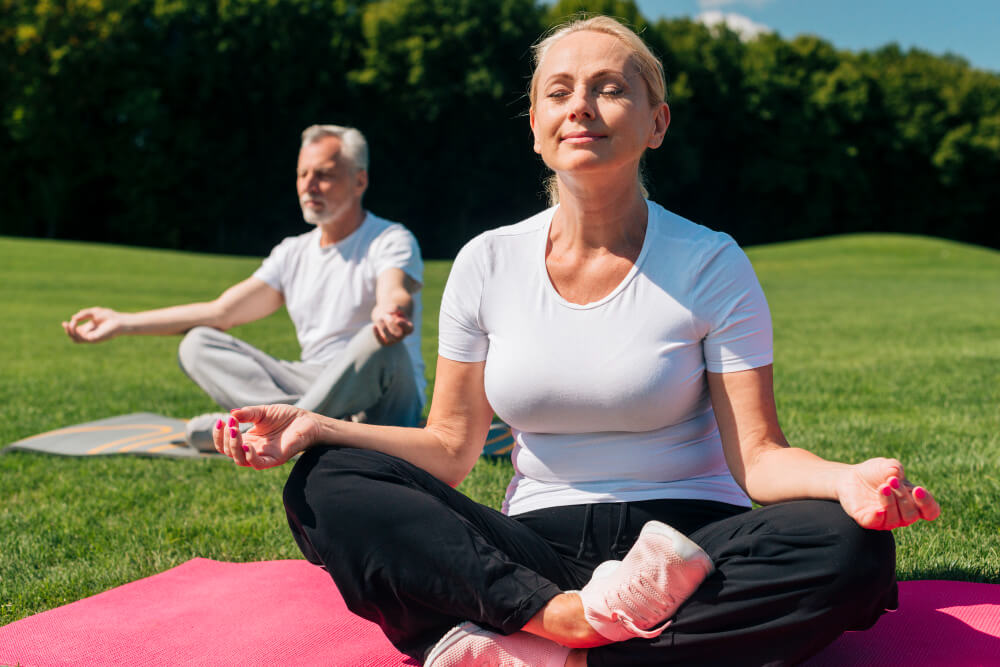Age-related cognitive decline can be brought on by a number of conditions, including brain deterioration and long-term illnesses. Still, research indicates that older persons who consistently practice mindfulness can enhance their mental clarity and memory retention. Many independent assisted living communities incorporate mindfulness practices specifically designed for seniors.
Seniors can improve their capacity for effective information processing and extend their attention span by practicing nonjudgmental awareness and present-moment awareness. Research also indicates that regular meditation practice can help reduce feelings of anxiety and depression, two prevalent disorders that a lot of older people suffer from. In this blog, we’ll examine eight ways that mindfulness techniques might help elders.
8 Ways Mindfulness Practices Benefit Seniors
Better Sleep Quality and Reduce Insomnia
Sleep disturbances are prevalent issues faced by aging individuals, often resulting from physical discomfort, restless leg syndrome, or sleep apnea. Fortunately, incorporating mindful techniques into one’s nightly routine has been proven to alleviate insomnia and promote deeper, more restorative slumber.
Engaging in relaxation exercises before bedtime, such as deep breathing or body scanning, along with other physical activities prepare the body for restful sleep. Moreover, integrating gentle yoga poses during the day can also aid in lowering fatigue and promoting overall energy balance throughout the day.
Optimal Digestion and Nutrient Absorption
With aging comes changes in metabolism, appetite, and digestive function, leading to nutritional deficiencies and potential health complications. Adopting mindful eating habits can significantly benefit seniors’ gut health. Additionally, proper nutrition plays is vital for boosting brain health.
By tuning in to internal hunger cues and savoring each bite consciously, seniors can better regulate portion sizes and avoid overeating. Additionally, paying closer attention to food preparation methods and ingredients can ensure they consume wholesome meals that suit individual needs and preferences.
Fostering Resilience and Coping Mechanisms
Aging inevitably brings about losses of friends, family members, and personal milestones; therefore, it is essential for elders to develop resilient coping mechanisms. Studies reveal that practicing mindfulness techniques can increase emotional stability, self-compassion, and social connectedness.
By accepting life’s challenges and difficulties without judgment, seniors can foster inner strength and maintain positive attitudes towards daily struggles. Incorporating gratitude practices and compassion meditations can further nurture these qualities and create lasting psychological benefits.
Sharpening Focus and Memory Retention
As individuals grow older, their ability to focus on tasks can decrease. However, mindfulness exercises help maintain cognitive function by improving attentiveness and memory recall capacity. Researchers have found that regularly practicing mindful meditation enhances neural pathways responsible for executive control and working memory, leading to better decision-making, problem-solving, and multitasking abilities.
Furthermore, mindfulness techniques for seniors suffering from dementia symptoms suggest reduced agitation levels and improved communication skills.
Boosting Positive Emotions and Reducing Negative Feelings
Older people often struggle with anxiety, depression, grief, and loneliness. Fortunately, incorporating mindfulness techniques can promote positive emotions and alleviate negative ones. By adopting present-moment awareness and acceptance, seniors learn to let go of past regrets and future uncertainties, thus reducing stress and promoting inner peace.
Studies reveal that consistent engagement in mindfulness practices leads to lower cortisol levels, decreased inflammatory responses, and heightened resilience against chronic illnesses. Moreover, seniors with higher levels of mindfulness demonstrate increased life satisfaction and a sense of purpose.
Mind-Body Harmony: The Physical Rewards of Mindfulness Practices
The relationship between mindfulness and physical fitness extends beyond its ability to increase motivation and focus during workouts. For instance, practicing deep breathing exercises before exercising or competition can lower heart rate, relax muscles, and minimize performance anxiety.
Moreover, integrative approaches involving mindfulness-based therapies (MBT), such as acceptance and commitment therapy (ACT) and mindfulness-based stress reduction (MBSR), show promise in managing chronic conditions such as diabetes, arthritis, asthma, hypertension, cancer, Parkinson’s disease, and Alzheimer’s disease.
By incorporating these complementary interventions into healthcare protocols, physicians can offer holistic care tailored to individual needs and preferences.
Boosting Immune System Response
A healthy immune system plays an essential role in combating illnesses and promoting healing; fortunately, gratitude practices can support the immune system’s efficiency. When seniors express appreciation for life experiences, people around them, and personal accomplishments, their bodies produce antibodies and white blood cells vital for fighting off viruses and bacteria.
Furthermore, acknowledging things that make us feel grateful releases mood-boosting neurotransmitters like dopamine and serotonin, leading to positive emotions and enhanced psychological resilience. As such, encouraging seniors to adopt a regular gratitude journaling routine where they note three good things every evening fosters both immune function and emotional balance.
Dealing with Age-Related Issues
Mindfulness equips seniors with a powerful tool for facing age-related issues with resilience. Whether it’s grappling with chronic pain, adapting to lifestyle changes, or navigating emotional hurdles, mindfulness fosters a mindset that embraces the present moment without being overwhelmed by the challenges of the past or uncertainties of the future.
Conclusion
Embracing mindfulness offers numerous advantages for seniors seeking holistic well-being. With scientific evidence supporting its effectiveness, there is no doubt that integrating these practices into seniors’ daily routines will yield transformational results.
Whether it means engaging in guided meditations, attending therapy sessions, joining support groups, or simply taking deep breaths during challenging moments, finding ways to implement mindfulness in everyday lives can empower seniors to thrive mentally, emotionally, physically, and spiritually.
As Carl Jung once said, “Your vision will become clear only when you look inside.” Let us encourage our elders to look within and discover the beauty hidden within themselves through mindfulness.
Contact Azalea Gardens today to learn more about our independent assisted living services and discover how we can support your loved one’s journey towards a healthier, more fulfilling life.





